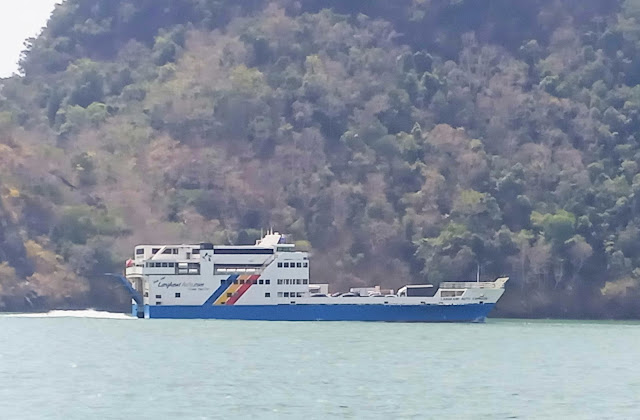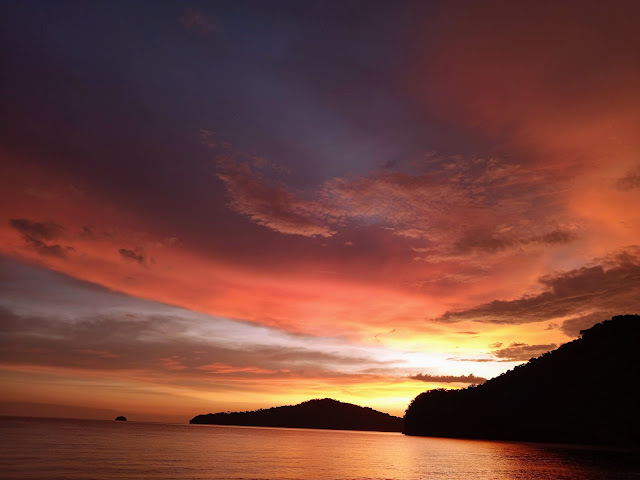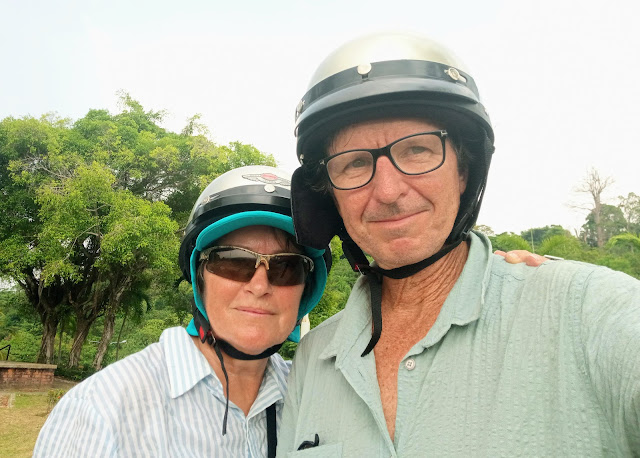Langkawi is so much more than we expected. As we got closer to the islands we saw that much of the vegetation is pristine natural rainforest on towering limestone mountains, some of it is mangrove forest. Secluded bays and beaches are everywhere and the surrounding warm sea is usually calm in the NE monsoon season. Incredibly scenic and postcard worthy.
Not everything is perfect in this paradise. The sea water is murky in most areas and we saw jellyfish almost everywhere. So we always swam wearing lycra leggings and tops and in some places we didn't swim at all as the water was too murky. As in most of SE Asia there is plenty of litter on the beaches and towns. A lot of it ends up in the sea.
Our first stopover was off a tiny little beach in a beautiful setting. In the evening the monkeys and monitor lizards appeared on the beach and in the morning the sound of different bird calls started early.
We needed to do the usual check in with the harbour master and customs so we anchored in the bay of the main town Kuah and armed with our growing file of paperwork we visited their offices for the necessary form filling.
The
reddish brown eagle symbolic with Langkawi is hard to miss in Kuah. The
harbour masters office, customs and immigration is part of this
complex.
The anchorage in Kuah has easy access to shore but is very busy during the day with tour boats coming and going. Many other yachts have seemingly been anchored there for some time as the harbour master has decreed this is the only anchorage where you can leave your boat unattended.
Langkawi is a duty free island so we were happy to stock up on two of our favourites - beer and chocolates. The beer especially is really cheap 😀
There is a large supermarket close to the anchorage so the next day we went shopping for provisions first and left Kuah to explore some of the intriguing bays.
The first stop was not far from Kuah, marked as Selat Penarak on our charts and we went ashore for a walk and swim. We noticed several sturdy wooden structures on the beach and on the waters edge. There is also a lone 'security guard' in a boat just off the beach. It seems that this was a set used for European Survivor and filming will take place there again this year. It also has fresh spring water trickling over a small creek - good to know for yachties!
The strait of Selat Penarak is also a passenger ferry route for ferries between Thailand and Langkawi, and also ferries for transporting cars.
We were keen to experience the "hole in the wall" on the north eastern side of Langkawi. It is a narrow gap between limestone cliffs giving access from the sea channel to the river Kilim. Once through the narrow gap it opens up into a mangrove rainforest creek accessible only by boat either from the sea or from a town further up the river.
The gap in the "hole in the wall":
It's very calm and peaceful on the either side lined with thick mangroves - a perfect all-weather anchorage. We found our spot close to the mangroves.
Many little tour boats from the town further up river race past taking tourists on mangrove tours and to see the eagles being fed.
We've seen our fair share of mangroves over the years but we dropped our dinghy and went exploring the extensive side creeks and watched some monkeys scavenging on the receding tidal edge. Mangrove forests are peaceful and intriguing by day.
At night all the insects from hell invade every space on the boat determined to get a fleshy bite. We smeared DEET stuff liberally on ourselves and burned mozzie coils all night. That didn't deter the bats from swooping through inches above my head.
The next morning we thought we'd get a head start on the tour boat cowboys and went by dinghy to the site known for fish eagle feeding. As soon as the eagles heard our dinghy motor they appeared out of nowhere and soon we had dozens of eagles circling above us. They were probably disappointed not to get their anticipated chicken skins from us but there's something off about an eagle behaving like a seagull eyeing one's chips.
Around midday the tide was high enough and slack enough for us to do the exit through the "hole in the wall" between the magnificent cliffs. The area is part of the Kilim Geoforest Park and a UNESCO protected site.
We carried on along the north shoreline of Langkawi, going past beautiful little bays (and spotting jellyfish in the water).
We rounded the corner to Tanjung Rhu beach and spent some time looking for a suitable depth anchorage as the tidal range was now almost 2m. Spring tides and a strong current made it a very bouncy anchorage. We went ashore for a walk and supper at the resort.
At spring tides, sandbanks appear in the anchorage and as the water recedes from the tiny little islands they take on weird shapes.
We stayed another day and explored the estuary by dinghy and swam off the beach in our lycra outfits. Tanjung Rhu is a long beach and it was nice to be able to get in a long walk. We saw more of the "Survivor" sets further away from the resort along the beach. We speculated that the filming angles must be so that it's not apparent a resort is about five hundred meters away.
We had hoped to continue further around the top of Langkawi but the wind forecast for the week was unfavourable for the exposed anchorages on the north side. So we headed back to Selat Penarak, waved hello to the "security guard" on his boat and stayed there for another day while Robert repaired a leaking water pump. We watched a group of otters playing on the deserted beach.
On our way to Kuah we saw a pod of dolphins swimming around the busy channel. Nice to see that they are around and not bothered.
At Kuah we anchored close to the fuel barge and Robert went across to them in the dinghy with his diesel drums for a refill.
There's 99 islands making up Langkawi and Dayang Bunting is one of the largest and surrounded by some of the most stunning views from the boat:
There's a large freshwater lake on the island of Dayang Bunting so we anchored close by and went to have a look and a swim. It's known as the Lake of the Pregnant Maiden and has a folklore story. It also has lots of bag snatching monkeys so we left our phones on the boat hence no pics. The entrance to the lake is only accessible by boat and tour boats drop off the visitors for about an hour.
We enjoyed our swim in the lake and as the last people to leave we got to see the monkeys raiding the bins and tossing out plastic packets, styrofoam food containers and baby diapers which will blow into the lake. The staff only come back in the mornings so we're guessing some litter still floating is cleaned up and some litter sinks into the beautiful deep lake.
Our anchorage close to the lake on the other side of the shore:
It was the perfect undisturbed spot for a magnificent sunset:
Stronger than usual wind was forecast for the next day so we moved on to a very protected anchorage known as The Fjords because the narrow channel is surrounded by high cliffs. Along the way we said "wow" a lot 😀
Another beautiful spot to overnight peacefully.
Since there was a bit of wind the next morning we went out away from Langkawi and lifted the sails. Nice to do laid back sailing for a couple of hours. We headed back threading our way through the small surrounding islands, intrigued by the caves at sea level opening up in the dropping tide.
We found a big sheltered bay with a white sandy beach and dropped anchor. Again we saw lots of dolphins close by in the bay.
When we went ashore behind the thickets of trees we found several pathways and large cleared circular openings some with potted shrubs. It seemed very much like the camps and meeting places in the Survivor series. There is also a creek behind the trees and interesting cliffs and caves held together by large roots of the trees above. A wonderful beach area to explore.
The next morning we moved on to The Pier which used to be a pier/jetty for a restaurant now closed probably since pre-Covid. We anchored for a few hours to enjoy the rare clearer waters, a beautiful beach where we saw a wild pig foraging and monkeys watching us. Robert didn't think the anchorage was secure enough if a thunderstorm came up during the night so we headed off to a nearby large protected bay near the cruise ship terminal to spend the night.
Around the corner from the cruise ship terminal is the popular Cenang beach and the next day we anchored off the beach and went ashore. It's a popular long beach with jet-skis, banana boats, para-sailing and various watercraft activities.
We hadn't been ashore for long when we noticed the sky darkening and the wind building up. We saw Pegasos bouncing up and down in the unsettled sea and decided to sit it out from the coconut milkshake shack.
My unease grew when we saw two waterspouts forming on the sea, one closer to the beach area. A waterspout is a tornado over water and varies in size and strength.
The wind got much stronger suddenly. Little boats and jet skis hurried back to the beach and vendors ran about collecting their umbrellas and chairs. Stray dogs ran frantically looking for shelter. Too late for us to get back to Pegasos and certainly not enough time to pull up the anchor by hand and move off. It rained buckets and we sheltered under a little beach stand watching poor Pegasos bouncing in the waves. The anchor held fast so nothing to do but wait it out. After about an hour the storm moved on, the rain and wind stopped and the sun came out again. Hardy tourists were already swimming by the time we dragged the dinghy back into the water to mop up Pegasos.
We went back to the previous night's anchorage at the cruise terminal. In the morning Robert struggled to lift up the anchor by hand especially since the anchor windlass isn't working and eventually it came up with a cement block and rope caught on the anchor. He cut it off with a kitchen knife. The seabed is so fouled in many places throughout SE Asia that it's not uncommon to pull up plastic bags and broken nets.
After the herculean anchor lift we moved off to Telaga, a small town on the north west of Langkawi and anchored off the pretty beach at Telaga.
We stayed for a few days and enjoyed the beach walks and relaxed amongst a few other yachts anchored nearby.
Telaga is a small quiet town with a nice marina. Very few shops were open and it has an air of not quite recovered yet from the covid shutdown.
We wanted to explore further islands but we had hardly left when the pitch of the engine changed suddenly and loudly. Robert quickly dropped speed. Something caught on the prop? We turned around, dropped anchor in our old spot and Robert dived under. Nothing on the prop but he did notice that the prop shaft support strut was loose. Checking inside there seemed to be a leak from that join. Maybe a submerged rope caught on it and pulled it loose but he couldn't fix it on the spot and not a good idea to sail about without getting it sorted first. We were a week early from our booking at Rebak Marina but we messaged them and they were happy that we could berth early. Luckily it was just a short distance away and we limped in 3 hours later and took our allocated berth in a lovely marina.
At our check in at the marina office, they told us that we also had access to the resort facilities so we wasted no time:
Robert manged to fix the leak and hopefully it will last until we haul out the boat later in the year. We will leave Pegasos here at Rebak Marina for the monsoon season. With an extra week to unpack the boat we had more time to relax in the heat of the day. A heatwave shortly after we arrived took temperatures up to 41 deg C on a particularly sweltering day.
One day we took the small ferry to the mainland and hired a scooter to do some sightseeing and shopping including a pricey fresh water pump.
We got our greenery fix by visiting the edge of the rainforest at the base of Ganung Raya the highest mountain in Langkawi. It was too hot and humid to attempt the 4,287 steps to a look out point so we did a short walk in the sticky heat.
The trees are huge and the vines on the trees have grown so thick they become like tree trunks.
Rice paddy with the usual water buffalo:
We joined in the celebration of Eid al-Fitr by stuffing ourselves with the vast spread of food at the resort buffet laid out to mark the occasion.
Sunset swimmers on Cenang beach with Rebak island in the background:
The SW monsoon rains are starting up and we've almost finished packing up the boat. We plan to return to Malaysia in November, haul out the boat here at Rebak Marina for antifouling, etc. and hope to sail on to Thailand at the end of the year.
This is our last blog update as I have been posting pics and updates on Instagram concurrently with this blog and found that it suits us better. Due Course Now was intended to chronicle our journey on Pegasos but moving with the times, Instagram is easier to upload pics with text. It's a private Instagram account for friends and family and anyone interested in following our story is welcome to follow us on marcelle_and_robert LInk below:
https://instagram.com/marcelle_and_robert?igshid=ZDdkNTZiNTM=




























































